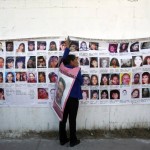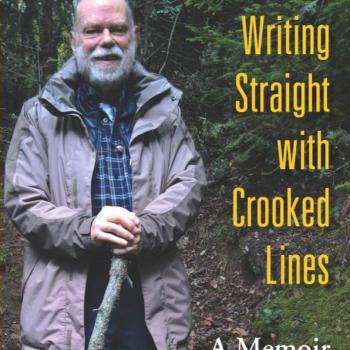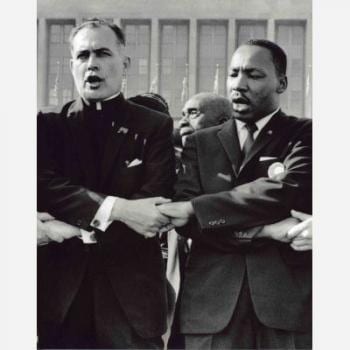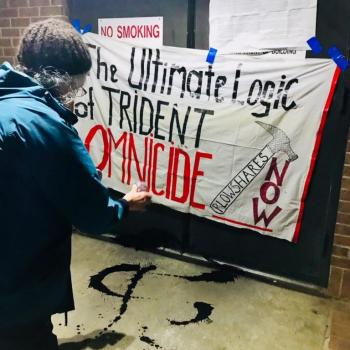The Participants
Ambassador: Between stints at universities and think tanks, has enjoyed several high posts as a political appointee. She identifies with the neo-conservative movement.
Professor (emeritus): A distinguished humanities teacher of the old school. His obscure essays appear in equally obscure philosophical-theological journals.
Talk Show Host: An experienced journalist, her views reflect for the most part what in the United States goes by the name ‘mainstream.’
Scientist: A Russian scientist trained in the hard sciences but with wide interests in many fields
………
AMBASSADOR. Though I don’t endorse torture, I do agree that “no moral value held dear by the American people obliges us to sacrifice innocent lives to spare a captured terrorist from unpleasant things.”[i] In any case, it is not as if torture was ever the official policy of the U.S. government. The real abuses, such as those at Abu Ghraib, were the actions of a few bad apples. Where else but America would those bad apples have been rooted out and punished?
SCIENTIST. Excuse me, but what do you call it, then, when an employee of the U.S. executive branch performs torture while following explicit orders from the highest levels of the U.S. government to perform torture?
AMBASSADOR. [coughing, and lighting a cigarette] I suppose you are referring to the so-called ‘torture memos’?
SCIENTIST. I suppose I am. But why “so-called”? Torture is exactly what those memos authorized, and torture was what was performed, all in accordance with detailed White House instructions. The memos explicitly call for the use of waterboarding, which the U.S. itself considered a crime punishable by death as recently as WW II; and they authorized sleep deprivation for up to ten days! Ten days! Not even Stalin during the Moscow show-trials needed that much time to extract his false confessions!
AMBASSADOR. What you forget is that it makes a huge difference who is carrying out these orders, and in what spirit they are carried out. I have seen no convincing evidence that anyone was kept completely without sleep for an extended period. Probably it was more a matter of limiting sleep to only a few hours a day. And I am sure there are various ways of conducting what you call ‘waterboarding:’ varying the amount of water and the duration of the pouring and so forth. And after all, medical professionals were present …
SCIENTIST. I guess if you get all your information from American news media propaganda it is no wonder that you should believe American torture is actually very kind. Well, Russian newspapers are not much better, at least as far as news about Russia is concerned. But even in Russia it is still possible, with a bit of effort, to find out what is actually going on, either on the internet [snickers from the others] or, … or on the Moscow Echo radio station, for example.
TALK SHOW HOST: Moscow Echo? I’ve never heard of it. But I must take issue with your statement that there is only propaganda in the U.S. news media. Certainly we have none of that on my show! And I hardly think Russia has a right to lecture Americans about human rights!
SCIENTIST. Though I am a very large person, all the same I cannot boast of being an entire country. I am just an individual man. All the same, I agree that the Russian state has a very bad record on human rights, and it has no right to lecture anyone. But in fact it doesn’t lecture anyone, while the U.S. government does, even though American torture has been widespread and brutal and has been practiced for many years, beginning in Latin America during the 1980s if not earlier. And yet America still pretends that it has the moral standing to lecture other countries on human rights! The torture of prisoners in secret CIA prisons is bad enough, but even worse are the cases of extraordinary rendition. Prisoners were sent to various countries around the world—Egypt, Syria, Uzbekistan—with full knowledge of what was awaiting the poor prisoners there. Egypt and Syria are bad enough, but what goes on in Uzbekistan—and I know Uzbekistan well, believe me—is beyond belief!
AMBASSADOR: What does go on in Uzbekistan?
SCIENTIST: If you want to know the truth, read the report by the British Ambassador to Uzbekistan at the time, in the first couple of years of the War on Terror, when most of these prisoners were being sent under the extraordinary renditions program. The British ambassador, his name was Craig Murray, got photographic evidence of prisoners in Uzbekistan who had been boiled alive. In other cases children were sodomized with broken bottles in front of their parents in order to extract confessions. Murray complained about it so loudly to the British government that he was eventually forced out on some sort of trumped up charges. In any case, the United States can’t claim it was unaware of the brutal torture going on there, because Murray brought it to their attention very insistently …
AMBASSADOR. I don’t trust a word this Murray fellow says. He was fired for womanizing, coming to work drunk, selling visas for sex or some such nonsense. I don’t recall the exact details, but obviously he has no standing to make declarations about morality.
SCIENTIST. The character flaws of Ambassador Murray are described in detail by Murray himself in his book – Dirty Diplomacy I think it was called in the U.S. edition … I highly recommend it. Yes, he was a womanizer and a hard drinker, he writes all about it. But all the charges of professional misconduct were dismissed, and in any case they were obviously just a way to silence him. He had always been a womanizer and a hard drinker, and no one gave a damn about it until he started complaining loudly about American and British use of so-called ‘information’ derived from Uzbek torture victims. As for me, I’ll take the morality of a womanizer any day of the week over someone who approves of boiling people alive, even if it is in the interests of American security!
PROFESSOR. In my opinion, the question of whether or not torture has been practiced by the American government, both directly and by proxy, is not very interesting, because we already know the answer. It was practiced.
TALK SHOW HOST. I would be happy to accept that the question is now settled, just on your authority alone, professor, but I gather that not everyone else here is so easily persuaded. Perhaps you could expand a bit on your statement?
PROFESSOR. Very well. I was so disturbed by the images of tortured victims that came out of Abu Ghraib that I decided to read everything I could on the topic. The best source I came across was a book called A Question of Torture by the respected University of Wisconsin historian Alfred McCoy.
What I learned is that, after WWII, the CIA spent several decades and several billions of dollars on perfecting a scientific and plausibly deniable – because it left no marks – form of torture, and then spread the results of this program all over the world. What most startled me was the revelation that the CIA was quite envious of the Soviet Union’s success in extracting false confessions. They had before them the notorious case of Cardinal Minsdszenty of Hungary, who confessed to all sorts of wild crimes during his trial in 1949, and of course, our Russian friend has just reminded us of the similar false confessions extracted during Stalin’s show trials of the 1930’s. The U.S. decided that it must beat the KGB at their own game and figure out how to get innocent people to confess to crimes they had never committed.
SCIENTIST: Hah! So there is where the dog is buried! I knew it …
PROFESSOR. [looking with puzzlement at the Scientist, he continues] What the CIA researchers discovered from Soviet torture techniques was that the most effective way to destroy a prisoner’s self was through the use of isolation, lack of sleep, extreme temperatures, and chronic hunger. The KGB also made use of self-inflicted pain, such as that induced by making victims stand still for 18 to 24 hours at a time. To this bag of tricks the Americans added a few others. They learned that a psychotic state could be induced still more rapidly by the use of sensory deprivation, which eventually led to the use of hooding and ear-muffs, as we can see in the pictures from Guantanamo Bay and so forth. Also, the removal of any reference to time, or, alternatively, blasting prisoners with constant noise. I should add that they also studied Nazi mind-control methods, but apparently learned little that was useful from them.
When CIA researchers looked at the KGB practices, they had no trouble labeling them as torture. It would seem odd to give them another name now, merely because their national origin has changed. By the way, what I have mentioned is by no means a complete list of techniques used. Various forms of beating or hanging people in painful positions for long periods also formed part of the new CIA torture playbook.
But something our Russian friend said earlier seems to me quite significant. “Not even Stalin needed that much time to extract confessions during the show trials.” This brings us back to the same question that was raised earlier: Why in fact has torture been practiced by the Americans over the past ten years?
TALK SHOW HOST. What do you mean, “What was the motivation?” Isn’t it obvious?
PROFESSOR. No, it is not. What do you think it was?
TALK SHOW HOST. Why, to get information that would prevent another attack on the United States! We were attacked, after all!
SCIENTIST. She is quite right, professor. It’s only common sense. What better way to get accurate information from someone than to deprive them of sleep for eight or nine days? It refreshes the memory like nothing else!
TALK SHOW HOST. I don’t think sarcasm is called for. You’re perfectly at liberty to disagree …
End of Part 1…
[i] From a speech by former Vice President Dick Cheney at the American Enterprise Institute on May 21, 2009. (Link to full text: http://www.aei.org/article/foreign-and-defense-policy/regional/india-pakistan-afghanistan/remarks-by-richard-b-cheney/ ; last accessed November 21, 2012)

















